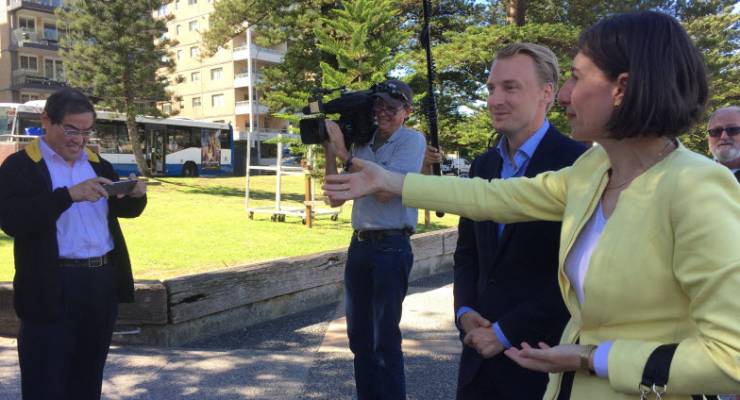
Three months after making history as the Liberal Party’s first-ever woman Premier, Gladys Berejiklian faced a sobering reality check at three New South Wales byelections on Saturday, as hers became the latest government to face the rising national tide of anti-Liberal sentiment.
Fresh from their drubbing in Western Australia, the Liberals copped primary vote swings of 12% in the Central Coast seat of Gosford, 15% in the blue-ribbon harbourside seat of North Shore, and fully 25% in neighbouring Manly, which was vacated by former premier Mike Baird.
That Liberal candidates will scrape home ahead of independents in North Shore and Manly may come down to the local peculiarity of optional preferential voting, which only New South Wales retains after its abolition last year in Queensland. If Greens voters in particular had been compelled to follow their usual habit of putting the Liberals last, rather than numbering one box and living it at that (as around 40% of them were reported to have done), the situation for the Liberals might well have escalated from embarrassment to humiliation.
In the two harbourside seats at least, the state Liberals’ problems seem to have been primarily of their own making.
Chief among them is the troublesome push for council amalgamations, which cost the Nationals the seat of Orange to Shooters, Fishers and Farmers at a byelection in November last year, and provided the motivating issue for the narrowly unsuccessful independent candidate in North Shore.
Voters in Liberal strongholds have also been primed for rebellion by the party’s debilitating factional warfare, which was again evident in the Manly and North Shore preselections (albeit that Labor’s effort in Gosford was no better).
However, distinctive state-level factors are much harder to identify in Gosford, such that Berejiklian and her government might feel justified in pointing the finger of blame elsewhere.
[Will Berejiklian’s deputy kill her chances?]
In a seat that went down to the wire in 2015, Gosford delivered the Liberals a 49% to 30% drubbing against Labor on the primary vote — and it could have been quite a lot worse if the as-yet-unregistered One Nation had been able to field a candidate.
What stands out about Gosford, particularly in comparison with Manly and North Shore, is its greying and low-income demographic profile, and the resulting concentration of voters who have lately copped the wrong end of penalty rate and pension payment cuts.
Low-income regional seats formed a crucial part of Turnbull’s firewall at last year’s federal election, compensating for the loss of a number of normally decisive seats in the suburban mortgage belts.
Examples include Gilmore in southern New South Wales, Page in the state’s north, the Queensland seats of Flynn, Capricornia and Dawson — and, most tellingly of all, the Gosford-dominated electorate of Robertson, which has gone the way of the winning party at every election since 1983.
So if it’s indeed the case that voters in places like Gosford are primed for opportunities to take a swing at the Liberals on account of federal issues, it becomes very difficult to envision a scenario for the next two-and-a-bit years that ends happily for Turnbull.
Liberal optimists might take reassurance from the fact that John Howard got himself out of a comparably difficult fix in the first three months of 2001, when the party suffered a landslide defeat in Queensland, the loss of office in Western Australia, and the loss of the normally safe Brisbane seat of Ryan at a federal byelection.
Political folklore records that Howard owed his victory the following November to the perverse good fortune of the Tampa episode and September 11.
However, his government’s fortunes were already on the mend by that point, thanks to such measures as an end to indexation of the petrol excise and a lifting of the tax-free threshold for self-funded retirees and pensioners.
This set the scene for the wholesale vote-buying that characterised Howard’s last two terms in office — the budgetary legacy of which is that similar luxuries have not been available to the governments that have followed.
[Childcare could be the circuitbreaker Turnbull needs]
For such reasons are the Liberals increasingly forming the view that the best defence available to them is attack.
This has been evident in Turnbull’s recent parliamentary assaults on Bill Shorten, and it receives further confirmation in the conclusions of Andrew Robb’s review into the party’s federal election campaign.
Given the doubts voters evidently harbour about Shorten, the effectiveness of such an approach should not be entirely discounted.
But it’s unlikely to dissuade voters from continuing to use state elections to vent their frustrations with the government in Canberra, which they will be given opportunities to do in Queensland, South Australia and Tasmania over the course of the next twelve months.








Hmm. Gladys Berejiklian has enough baggage without needing Turnbull. There have been major scandals over her time as Transport Minister, ridiculous privatisation and decisions for which corruption seems the only reasonable explanation. No need to look to the Feds. I am disgusted by the crookery in NSW.